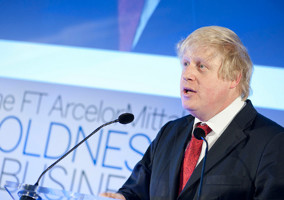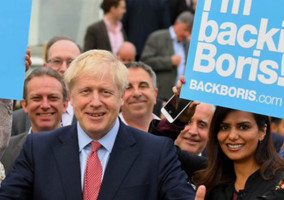Boris Johnson signed off his last prime minister's questions today by declaring “mission largely accomplished” and telling MPs: “Hasta la vista, baby.”
These characteristically unabashed remarks come weeks after Johnson agreed to terminate his leadership of the Conservative party, following pressure from his own government. At the end of his final PMQ's he received a standing ovation from most Tory MPs present (some more enthusiastically than others).
Johnson intends to remain in post over the summer as Tory party members choose his replacement, but parliament is now not due to sit again until 5 September. Rishi Sunak and Liz Truss remain in the running, after Penny Mordaunt was knocked out earlier today.
In a three-year leadership period characterised by Brexit, the coronavirus pandemic and a cost of living crisis, Johnson was … a polarising politician.
On his appointment to the position, charities urged the prime minister to focus on communities and helping the most vulnerable. The sector asked for clarity around plans for a Shared Prosperity Fund, highlighting the need to replace funding from the European Union, and emphasised that charities need a stable economy to thrive. Some felt the delay in publishing guidance undermined goals and made it difficult for local areas to plan.
Little was known as to what his view of the sector, or commitment to it, was – aside from that as mayor of London he set up a charity, the Mayors Fund for London. It exists to champion opportunities for young Londoners from low-income backgrounds, and most recently reported an income of close to £3m. The prime minister was also a high-profile supporter of the unsuccessful Garden Bridge Trust initiative.
Stoking culture wars and Sewell report
Ultimately, those in civil society want to see a government willing to build stronger communities and a fairer society, and Johnson did not always deliver.
During his tenure, charity leaders urged the prime minister to reject the findings of a report which concluded that the UK does not have a systemic problem with racism, the Sewell report, and also wrote to Johnson asking him to apologise for offensive language used in the past. Samuel Kasumu, adviser for civil society and communities, quit his role over the government's handling of the Sewell report.
Many also accused Boris Johnson’s government of stoking culture wars, or at least doing little to quell those responsible. Members of the not-so-aptly named “Common Sense Group”, which included several Tory MPs, wrote to Barnardo’s chief executive accusing the charity of “political dogma” and called on the Commission to investigate. The regulator found Barnardo’s did not break any charity rules when it published a blog on inequality and white privilege.
The regulator also opened a regulatory compliance case into the National Trust in September 2020, after the charity published an interim report examining links between its properties and history of colonialism and slavery. Ultimately it found no grounds for regulatory action against the National Trust.
Government aid contributions slashed
Elsewhere, Johnson broke his promise to keep government aid contributions at 0.7%, cutting them to 0.5% of gross national income. This breach of commitment meant a number of organisations were forced to pull out of projects and slash funding to some of the world's most vulnerable people.
Johnson also made the decision to merge the Foreign Office and the Department for International Development (DfID). He created The Foreign, Commonwealth and Development Office (FCDO). The merger did not come as a surprise to a lot of people, as the prime minister had made no secret of his desire to see the foreign aid budget spent more in line with the UK’s “political and commercial interests”.
Nonetheless, many said that these moves marked a bleak period in British history, with the government seeming to turn its back on the world's poorest people, amidst a global pandemic.
The 2022 Aid Transparency Index recently revealed the FCDO has fallen seven places to 16th in its rankings since the merger. It dropped 13.5 points, falling from “very good” to “good” compared with DfID’s score in 2020.
Perhaps the long-term impact of these decisions is not yet clear, though certainly many thousands of people will have had necessary, and promised, support withdrawn.
Johnson and Ukraine
In his resignation speech, Johnson spoke of the government's commitment “in standing up to Putin’s aggression in Ukraine” and he has been praised by some for his support of Ukraine.
He addressed the people of Ukraine, saying “I know that we in the UK will continue to back your fight for freedom for as long as it takes”.
Earlier this year Civil Society News revealed Boris Johnson is a patron of a charity partly funded by Putin money called Downside Up, into which the regulator has now opened a compliance case.
What does the future hold?
During his tenure, Johnson made a number of promises around “levelling up”, ostensibly with the aim of reducing the imbalances between areas and social groups across the UK.
In his resignation speech, the former Etonian said “of course it is painful not to be able to see through so many ideas and projects myself”. Indeed, the fate of the levelling up agenda will depend on the programme of his successor.
Charity leaders have attempted to influence government throughout Johnson’s tenure, and unfortunately often struggled. And for those who have managed to communicate with Johnson’s government, they may now expect their efforts to be hampered as the leadership changes hands. Therefore, many in the sector would likely welcome a more steady leadership after the summer.
Those in civil society want a prime minister who will work with them to make important changes, and help create a fairer society. Charities need a government which supports and champions civil society, and importantly, keeps its commitments.
Related Articles











